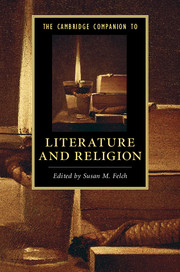4 - Ethics
from PART II - INTERSECTIONS
Published online by Cambridge University Press: 05 September 2016
Summary
In the Western cultural imagination, ethics, religion, and literature exist at an uneasy crossroads, a crossroads often marked by mutual suspicion.
Ethics is suspicious of literature for a variety of reasons, although two such reasons surface with some regularity. First, say ethicists, literature is fictive and therefore must be, at some level, fraudulent. Second, literature stirs the emotions and so can incite and prolong unregulated and disordered desire. Plato's view of literature is more nuanced than his censorship of poets might suggest, but their ban is real nevertheless. And it is not as though these ethical worries have no basis in fact. Every genocide begins with a good story – a compelling narrative about the inhumanity of its victims that incites neighbor to kill neighbor. Literature professors love to talk about the deeper truths revealed by stories, but stories can also propagate – and prop up – horrendous lies. Stories are not necessarily true, but they are powerful, as Plato well understood.
On the other hand, literature, particularly contemporary literature, is often suspicious of ethics. Few epithets are as demeaning to an author as “pedantic,” a term critics find useful when they sniff out moral agendas in a poem or novel. Many twenty-first century readers agree, perhaps unthinkingly, with Archibald MacLeish: “A poem should not mean / But be,” itself a baldly didactic claim.
Sometimes these ethical worries about literature and literary worries about ethics are elided with religious concerns. Among the poets Plato bans from the Republic are those who tell false stories about immoral, duplicitous, and violent gods. When Augustine, in the Confessions, berates himself for crying over Dido, he worries that his empathy for a fictional tragedy will displace sorrow over his own distance from God. English translations of the Bible from the fourteenth century onward inveigh against the “vain imaginations” of human thought that may substitute fantasies for true words about God and the world. And yet narratives and lyrics, stories and poems, are integral to religious accounts, as the chapters in Part III of this volume demonstrate. Most, if not all, religious traditions understand themselves through one or more overarching narratives. There is a story or stories to be told of how a community practices its faith.
- Type
- Chapter
- Information
- The Cambridge Companion to Literature and Religion , pp. 71 - 85Publisher: Cambridge University PressPrint publication year: 2016



